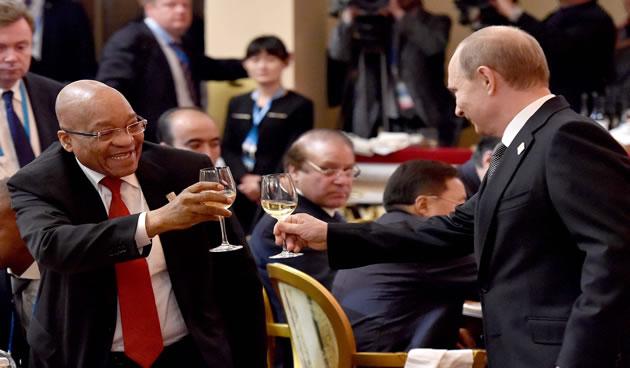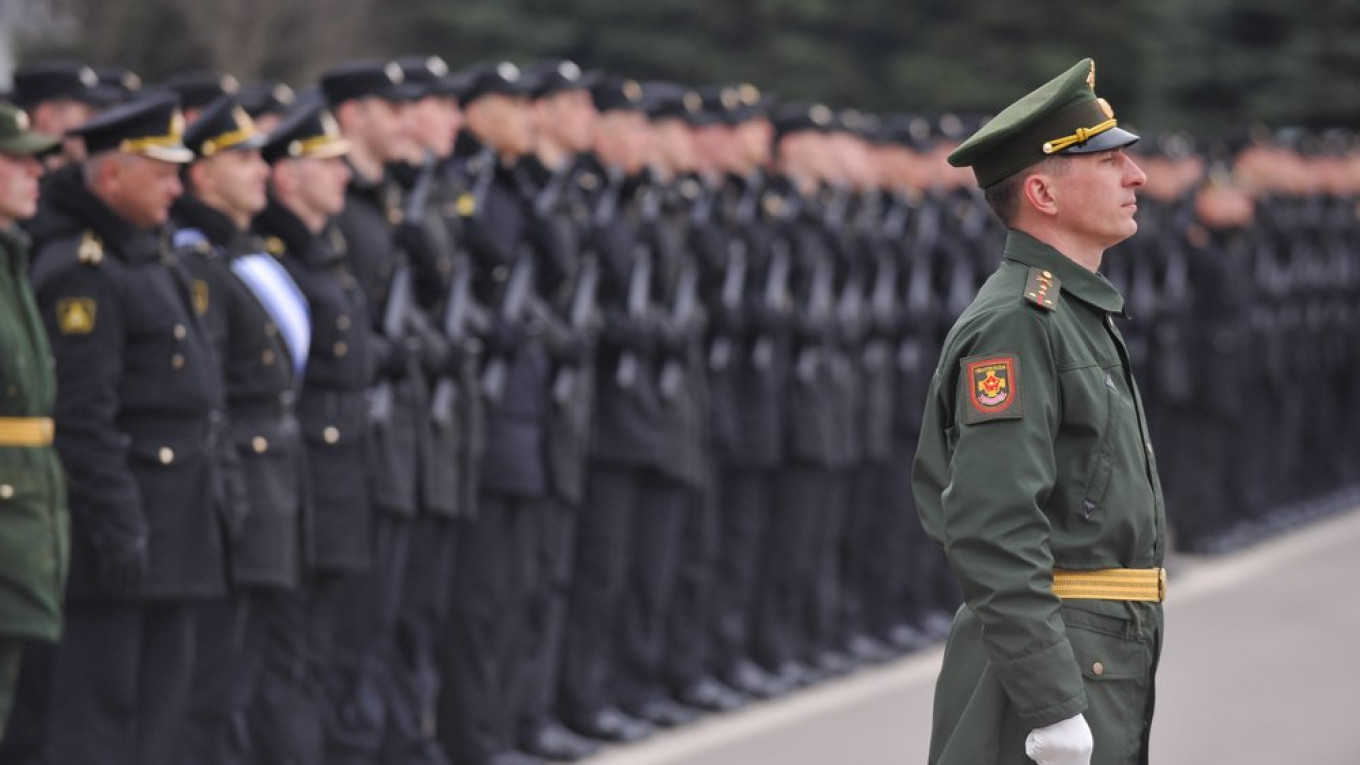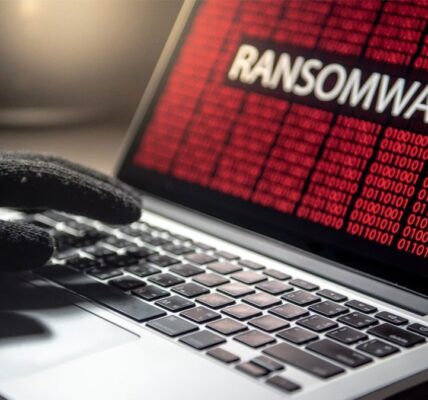On December 28, 2007, the Directorate of Special Operations (DSO), known as the Scorpions, charged Jacob Zuma with eighteen charges of money laundering and corruption based on seven hundred and fifty-three illicit payments he received while serving as the Deputy President of South Africa. The indictment of Zuma was the result of an extensive investigation by the Scorpions that commenced five years earlier in 2002. The investigation was global, involving the Scorpions working through mutual law enforcement with law enforcement agencies across 12 countries.
The indictment followed the conviction of Zuma’s financial adviser, Schabir Shaik, in May 2005 on two counts of corruption and one count of fraud. In the verdict of the trial, the judge stated that there was “overwhelming evidence of a corrupt relationship between Zuma and Shaik.” The Scorpions combined intelligence collectors and analysts with detectives and prosecutors in one law enforcement unit. In July 2006, Ivor Powell, a now-deceased senior intelligence analyst of the Scorpions, produced a “Top Secret” classified summary of different intelligence reports they received about the fact that Zuma had multiple clandestine foreign intelligence affiliations. The report was codenamed “Browse Mole” to indicate that the Scorpions received credible intelligence from several sources that Zuma is a paid agent (a mole) of more than one foreign intelligence service. Powell found the intelligence so compelling that he recommended in the intelligence report that the Scorpions should initiate a criminal investigation into Zuma for conspiracy to sedition.
The then Director of National Prosecutions (NDPP) Vusi Pikoli sent a copy of the top-secret report to the Director General of the National Intelligence Agency (NIA), the government agency with responsibility for counterespionage and counterintelligence. Arthur Fraser, who at the time served as the “General Manager of Counterintelligence” for NIA, immediately unlawfully leaked the top-secret Scorpions’ report by faxing a copy of the report to one of the country’s trade unions, COSATU. Powell was targeted with a brutal disinformation campaign which included his unlawful arrest and detention by the police. The leak of the Browse Mole report, like the subsequent unlawful leak of the illegal wiretapping of Leonard McCarthy, the Head of the Scorpions, by Fraser and his associates, were serious criminal offenses and an abuse of power. These acts were deliberate to conceal a near and present danger to South Africa as a democracy.
It was no surprise to see years later the same Arthur Fraser, now serving as the Director-General of Correctional Services, orchestrating the unlawful release of Zuma from prison under the pretext of “medical parole” after Zuma was convicted of contempt of court in 2021. Once Zuma is elected as President, he uses both unlawful leaks—the leak of the Browse Mole report and the illegal wiretaps of the Head of the Scorpions—to terminate his prosecution by the Scorpions and to kill the Scorpions as a law enforcement unit.
Militarizing Electoral Politics
Now Zuma has returned to politics with a new political party—MK. With its ostentatious display of weapons, uniforms, and Soviet-style stiff-legged marching, Zuma’s new political party—MK—is deliberately militarizing South Africa’s democracy, commencing a new wave of his assault on South Africa as a constitutional democracy on behalf of his masters in the Kremlin.
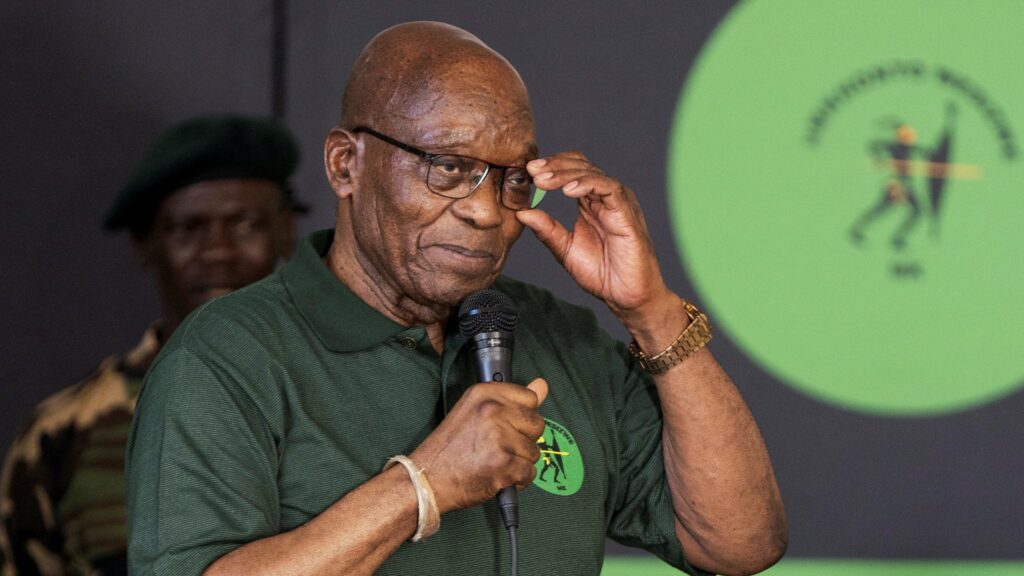
Jacob Zuma at the launch of his new party, uMkhonto Wesizwe, in 2023.
The Social Research Foundation poll reports that in the May 2024 election, Zuma’s MK party can take up to 50% of the ANC’s support in KwaZulu-Natal, the province which in recent years has been the ANC’s power base. The same survey estimated the national support for MK at 9% of the turnout on election day. This could reconfigure South African politics.
KwaZulu-Natal has a highly militarized political culture. In the years preceding the democratization of South Africa, an estimated 20,000 people died in a decade-long conflict between the Zulu nationalist Inkatha Freedom Party (IFP) and the ANC in which Jacob Zuma had been a dominant political presence. Between 2010 and 2023, approximately 600 political executions occurred in this province. Jacob Zuma served as the President of South Africa for most of these politically violent years (from May 9, 2009, to February 14, 2018). He resigned from the presidency in February 2018 amid corruption allegations and legal challenges.
The Russian Option
President Zuma’s new party’s name—MK—is an abbreviation for the former armed wing of the ANC, Umkhonto we Sizwe. The name MK also has strong Russian connotations. The Eastern Cape Herald recently reported that among ANC cadres, MK is called “the Russian option.” MK is the Russian language abbreviation for the Bolshevik Revolution of 1917. It is also the Russian language abbreviation for a foreign subsidiary of a Russian company with an international focus. This last meaning—a foreign Russian subsidiary—rather than the history of the ANC’s armed wing—may well be the truth about MK.
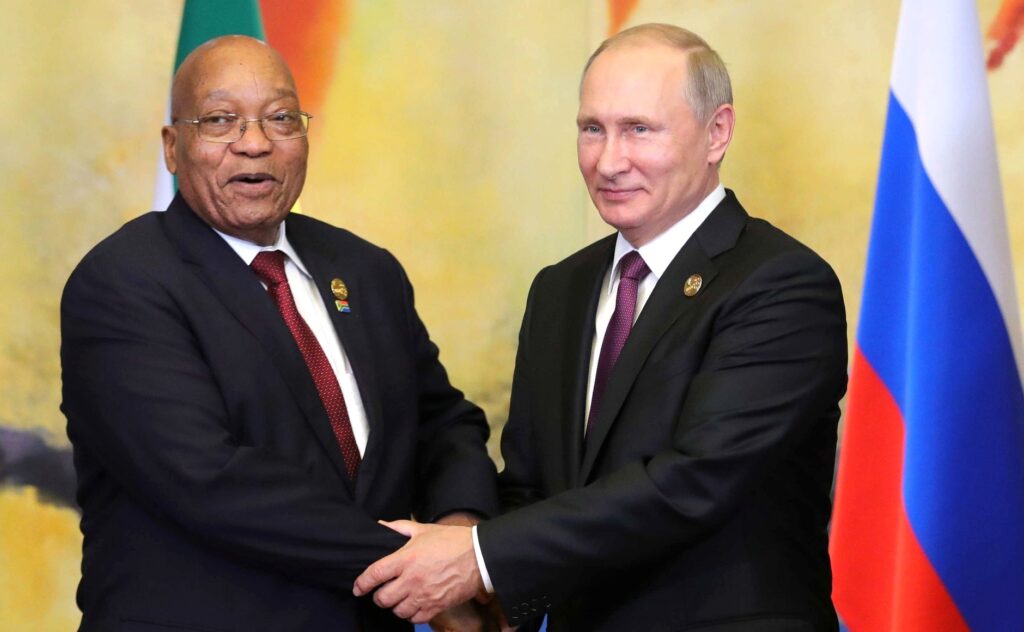
Vladimir Putin had a meeting with President of the Republic of South Africa Jacob Zuma on the sidelines of the BRICS summit in Xiamen
The Russian Glavnoye Razvedka Upravleny (GRU)
The key finding in the intelligence that the Scorpions received back in 2006 that prompted the Browse Mole counterintelligence investigation was not reported until now—Jacob Zuma has a longstanding paid agent relationship with the Russian GRU or the Russian Glavnoye Razvedka Upravleny (GRU), the Directorate of Military Intelligence of the Russian General Staff.
The first time that Zuma’s relationship with the GRU came to the Scorpions’ attention was in a separate investigation into the Russian arms dealer Viktor Bout, who operated from South Africa and Swaziland from 1997-2002. Bout worked for the GRU on illicit arms deals across Africa and the world, earning himself the sobriquet “Merchant of Death.” Bout met Zuma regularly and made frequent cash payments to Zuma for “protection.” The Scorpions disrupted Bout’s operations in South Africa.
Following the destruction of the Scorpions, state capture commences under Zuma’s leadership. Putin brings back the GRU officer who was his handler during the Cold War from retirement, and he commences regular meetings with Zuma in South Africa and around the world using commercial cover. The GRU enables Zuma to meet with Putin on a regular basis. Together they set out to break South Africa as a constitutional democracy and to foist an $80 billion nuclear program on the country in collusion with Vladimir Putin, a corrupt deal so big that Putin was personally going to benefit from it financially.
The Guptas receive payments on Zuma’s behalf in Hong Kong for the nuclear deal. Zuma removes all restrictions on the GRU’s operations in South Africa, cementing links between the GRU and South African Special Forces and the senior leadership of the intelligence community. The Carnegie Foundation report of 2019 reports how South African civil society and the rule of law disrupted the GRU’s operations. I wrote about this in the Vrye Weekblad in 2023.
MK is the first political party in South Africa’s democracy that has been formed with the active sponsorship of a foreign intelligence service—the GRU. It has been designed to be part of the network of assets that the GRU is building across Africa under the rubric of the “Africa Corps”—a network of Russian private military companies, arms dealers, and client juntas for the profit of Putin and the Kremlin. The GRU runs all the illicit Russian arms deals across Africa and worldwide.
The arms deal between Rosoboronexport—the Russian arms exporter of the entire range of military, dual-use products and services and technologies—to provide armour-piercing shells and automatic rifles to South African Special Forces and to export South African weapons for use in the war on Ukraine that was transported by the mysterious Lady R in December 2022 is a classic arms deal coordinated by the GRU.
The GRU is the most notorious of the Russian intelligence services. Russia’s Main Directorate of the General Staff of the Armed Forces—officially known by the acronym GU, though more commonly referred to as the GRU—is unlike the KGB’s successor organizations, the SVR and FSB, in many ways. Since its founding under a different name by Leon Trotsky in 1918, it has enjoyed virtually uninterrupted continuity as the Russian military’s clandestine intelligence service.
Headquartered in a fortified complex in Moscow, the centrepiece of which is an enormous building known as the Stikliashka (or “Glass House”), the GRU answers directly to Russia’s Chief of the General Staff and is technically under the authority of the Russian Ministry of Defense. One of the defectors from the GRU reported that new recruits must watch a film of a traitor to the GRU being incinerated alive as part of their induction into the service.
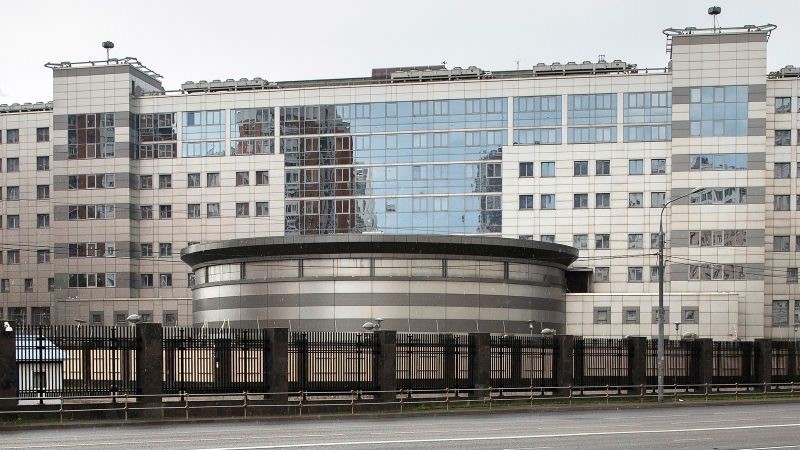
The headquarters of GRU in Moscow. Pavel Golovkin/AP
It was the GRU that choreographed the seizure and annexation of Crimea, as Vladimir Putin admitted in a documentary that aired on Russian state television in March 2015. Since then, Ukraine has functioned as a laboratory for Russian military doctrine and GRU subversion efforts. According to Mark Galeotti, a Russia security specialist at the Royal United Services Institute, a think tank in London, the Glass House oversees “the gangster-warlords, militias, and mercenaries of the Donbas” of eastern Ukraine.
The GRU operates globally, including running hostile operations in the United States and the United Kingdom. Two different units of its operatives hacked Democratic Party emails in the lead-up to the 2016 U.S. presidential election, according to an indictment issued by the office of Special Counsel Robert Mueller. The intelligence agency then disseminated their contents via GRU-run internet personae called Guccifer 2.0 and DCLeaks.
In March 2018, the attempted assassination of Sergei Skripal in Salisbury, England, was run by two GRU hit men, later identified by Bellingcat as Anatoliy Chepiga and Alexander Mishkin. British authorities said the murder weapon was a proscribed military-grade nerve agent called Novichok, the unleashing of which ultimately killed one British civilian and landed several more in critical condition.
Skripal had been a GRU colonel who spied for MI6, Britain’s foreign-intelligence service, from 1996 until his arrest in Moscow in 2004, ultimately spending six years in prison before he was traded back to Britain as part of an Anglo-American spy swap with Moscow. The Skripal poisoning, an act of international terrorism, led more than 20 Western countries to collectively expel more than 100 intelligence officers.
The Events Leading Up to MK’s Launch
It is worth revisiting the timeline of events in the run-up to the registration of MK as a new political party on September 5, 2023. In May 2023, Russian state media praises Duduzile Zuma-Sambudla, Zuma’s daughter, as one of the first to use the hashtag #IStandWithRussia on Twitter and published joint photos of her father with Putin. This is the launch of the GRU’s global propaganda campaign in support of the invasion of Ukraine.

In June 2023, Russian state media published an article that highlighted opinions expressed by Zuma that the “crisis” in Ukraine was created by NATO countries in attempts to counter BRICS. The GRU’s social media trolls shared a video of Zuma saying “Russia said that this [Ukraine] is their neighbour, that you cannot bring NATO into a neighbouring country. And this particular war is actually related to the existence of BRICS. The West doesn’t like the existence of BRICS.”
Despite having been placed on medical parole on July 7th, Zuma is well enough to travel to Zimbabwe on a Russian-funded trip with Duduzile. In Zimbabwe, he promotes a carbon credits scheme from Belarus funded by Russia as a new scheme to evade sanctions. From Zimbabwe, he is whisked away by his Russian handlers on a Russian plane for “medical treatment” in Moscow, now claiming he is suddenly feeling unwell again.
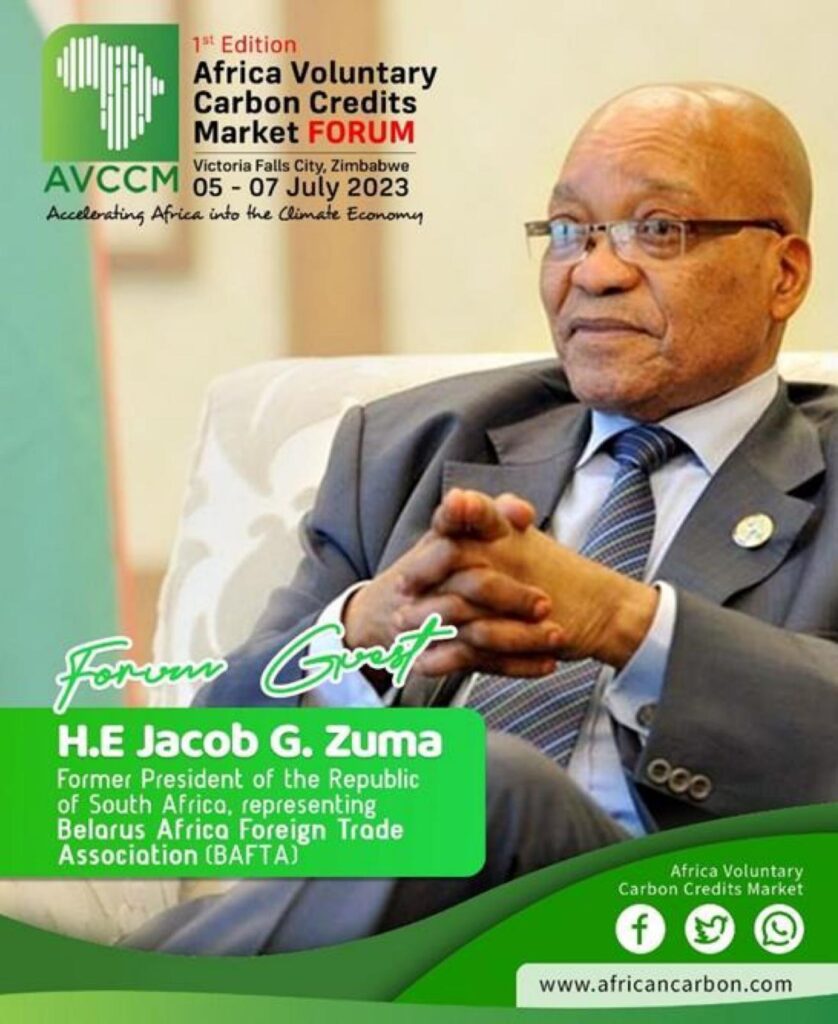
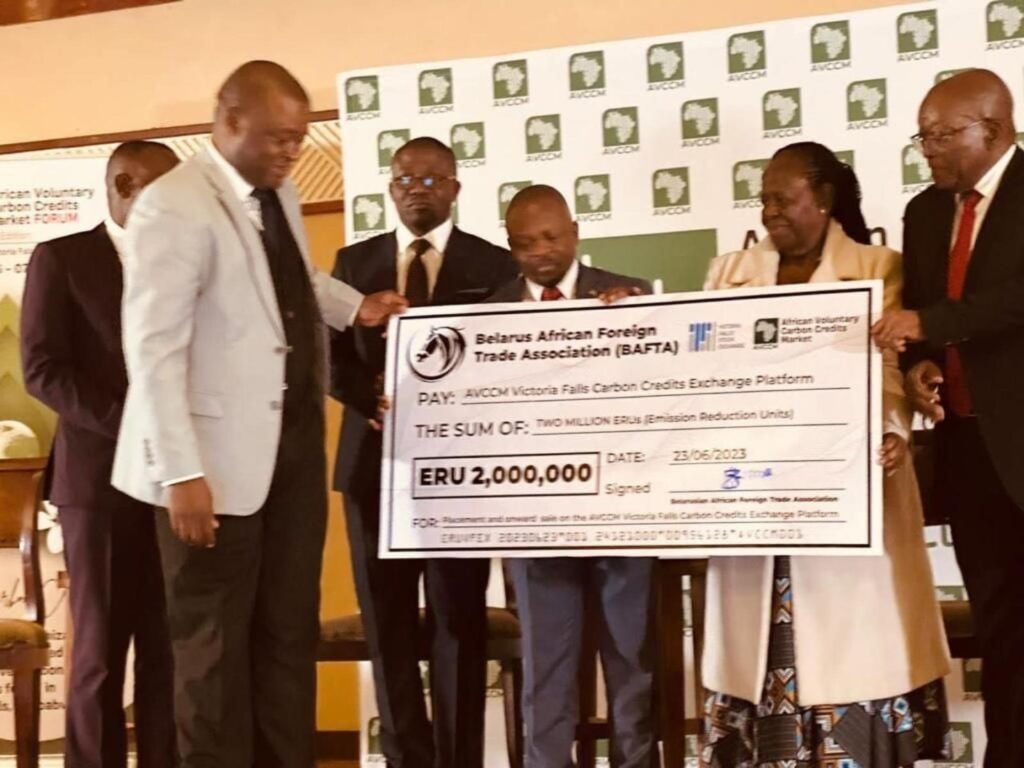
1-Kwanele Hlabangana, Africa Voluntary Carbon Credits Market Chairman. 2-Nqobizitha Mangaliso Ndhlovu, Environment, Climate, Tourism and Hospitality Industry Zimbabwean Minister. 3-Michael Usi, Malawi Minister of Environment. 4-Rejoice Mabudafhasi, South African Ambassador to Zimbabwe
In the meantime, back home, the Constitutional Court in South Africa rules that Zuma has to return to prison because his medical parole is unlawful and invalid. All the travel arrangements—South Africa, Zimbabwe, Russia—for Zuma were ultimately made under the signature of Major-General Andrei Veryanov, the Head of the Clandestine Service of the GRU.
Other than for Zuma to continue to abscond from prison, the real reason for Zuma’s visit to Moscow is to attend Putin’s Africa Russia Summit on 22-23 July. He announces that he is extending his stay in Moscow. During the Summit, Putin and Veryanov broker a deal between Ramaphosa and Zuma that will keep Zuma out of prison going forward. The GRU has a secret mission for Zuma that requires him to be out of prison—the launch of its first wholly-owned political subsidiary, MK, as a political party in South Africa.
Zuma returns triumphantly on 3 August to South Africa. His Russian-brokered deal to stay out of prison is announced on 11 August by the Government under the guise that this is part of a new program to reduce overcrowding of jails. Three weeks later, on 5 September, on Zuma’s instructions, Jabulani Khumalo registers MK as a new political party. Russia state-owned media announces Zuma’s return to politics.
Over the same period from June to August, the GRU dismantles the management of its most valuable asset in Africa, Prigozhin and the Wagner Group, on Putin’s instructions. Prigozhin is assassinated on 23 August when his plane is blown up. In the same week of September when MK is registered as a new party, Yunus-Bek Yevkurov, the Russian Deputy Minister of Defence with General Andrei Averyanov, the head of the GRU clandestine services, start a tour across Africa to meet with the Wagner Group’s African clients to advise them that they will work directly with the Russian Ministry of Defence going forward. Zuma sends emissaries in support of General Averyanov’s mission to the CAR where, during his Presidency, he did a major SA military deployment.
On 6 December, Democratic Alliance Councillor Ndlovu is shot 10 times in front of his family by two assassins. On 16 December, Zuma endorses MK as his new political party. At the same time, the GRU announces on its propaganda channels the rebranding of the Wagner Group as the “Africa Corps,” the same name as Hitler’s military deployment to North Africa.
What Does MK Mean for South Africa?
The fusion of the GRU’s Africa networks with local organized crime syndicates through Zuma and the MK Party poses a new and gravely dangerous threat to South Africans and to South Africa as a constitutional democracy.
Since the dawn of democracy, South Africa grapples with the intertwined challenges of economic transformation, organized crime, and institutional weaknesses.
The criminalisation of the state under Zuma following the destruction of the Scorpions led to the proliferation of mafia-style interests in the supply- and value chains of various sectors of the formal economy.
The Gcaba brothers is an organised crime family that owns the lion’s share of the taxi businesses in KwaZulu Natal. They are nephews of Zuma. The Gcaba brothers’ networks are an integral part of MK. Due to their network of hitmen, other violent economic interests such as the construction mafia use the family for protection services and enforcement to maintain positions within the state’s procurement regime. As the proliferation of the extortion economy – pervasive in supply lines of government procurement in the province of KwaZulu-Natal – extends its influence, legitimate enterprises find themselves compelled to navigate an environment characterized by violence and state complicity.
The state’s response to the mafia threat to date has been uncoordinated and weak with limited capacity. Despite publicized arrest figures, doubts persist about the extent of the state’s commitment to combating these criminal activities. More than a hundred prominent members of the governing ANC had been implicated in the crimes of state capture by the Zondo Commission of Inquiry, some of them still members of President Cyril Ramaphosa’s cabinet.
In the meantime, feeding off the criminalized state, MK militarizes South Africa’s body politic with threats of draconian new policies and of unprecedented political violence and intimidation.
Fighting organized crime and terrorism on this scale is extremely difficult for a constitutional democracy. Only the rule of law can now protect South Africa from Zuma’s predatory politics. South Africans must turn out to vote against organized crime and predatory foreign interference. Zuma must be returned to prison to complete his sentence. The long-delayed and stalled prosecution of Zuma on corruption charges needs to proceed without any further delay. MK must disclose its foreign sources of financing under South African electoral laws, and if it does not, the law must be enforced. The capacity to fight organized crime must be rebuilt combined with effective counterterrorism and counterespionage capabilities. Alliances need to be revived with other democracies facing similar threats.
Make no mistake this will require great sacrifice and a strong political will from a new South African government after the upcoming elections. It will be a tough fight, but ordinary South Africans can do extraordinary things- we, the people defeated Zuma and state capture before and can do so again. Lord Renwick of Cliveden, former British Ambassador to South Africa and to the US stated: “This is an authoritative first hand analysis of Zuma’s web of corruption, the incalculable damage he did to his country as President and the present danger he continues to pose, with the Kremlin’s involvement and direction. Zuma’s corruption was first uncovered by the Scorpions, and after Zuma destroyed the Scorpions, disrupted during Zuma’s second term by a combination of an intrepid civil society and the courts. All South Africans and the international community now need to come together again to defeat Zuma, the MK Party and their predatory sponsors.”

